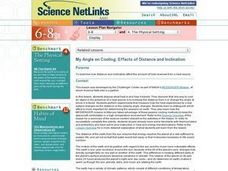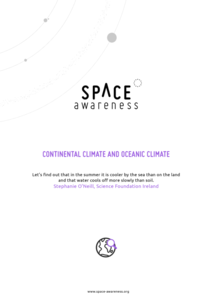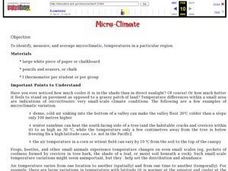Carnegie Mellon University
Introduction to Climate
Begin a full instructional activity on climate change by demonstrating how carbon dioxide gas contributes to increased temperatures. Be aware that pressure inside the antacid-containing bottle in Activity 2 may cause the lid to fly off;...
Curated OER
Sustainable Marine Fisheries
Through a fishing simulation, environmentalists discover consequences of over fishing. Afterward, they discuss how the activity relates to the impact of real-life commercial fishing. They also consider sustainability in the fishing...
Curated OER
Writing in Note Form
Taking notes is the topic today. Kids learn why notes are taken, when they are useful, and how to pick out the most important information to make their notes functional. Several interesting examples of various note forms are shown, along...
K12 Reader
Taiga Ecosystems
After reading a short article about taiga ecosystems, middle schoolers are asked to identify the characteristics of this chilly environment.
Curated OER
My Angle on Cooling: Effects of Distance and Inclination
Learners discuss what heat is and how it travels. They discover that one way to cool an object in the presence of a heat source is to increase the distance from it or change the angle at which it is faced.
Curated OER
The Earth's Atmosphere and Temperature
Students describe and compare the layers of the atmosphere. They explain how to measure the temperature of the atmosphere and discover what causes the atmosphere to heat up in some places more than in others.
Teach Engineering
A New Angle on PV Efficiency
Let me get an angle on this! Investigate the orientation of a photovoltaic panel and its effect on efficiency. By using a light source, learners collect and plot current output to determine the ultimate orientation. The resource includes...
Teach Engineering
Biomes and Population Dynamics - Balance Within Natural Systems
How large can a population become? The fifth installment of a nine-part unit teaches young ecologists about limiting factors that determine the carrying capacity of species in the Sonoran Desert. Here is a PowerPoint to help present this...
International Technology Education Association
Reinventing Time
Take a trip through time. A lesson resource provides instruction on the origin of current measurements for time. The text explains the different tools humans used throughout history to measure time as well as provides examples such as...
K12 Reader
Taiga Ecosystems
Introduce your class to another type of ecosystem, the taiga ecosystem, through a reading passage. Class members read the text and then respond to five reading questions about the content of the passage.
Space Awareness
Continental Climate and Oceanic Climate
There's nothing better than a cool breeze blowing in from the ocean. Scholars explore how water affects change in temperature using a hands-on experiment on climate. They use measurement tools to compare the continental and oceanic...
Curated OER
Classification and Adaptations- Streams, Rivers, and Lakes - Where the Land Meets the Sea And Caribbean Reef
In this science worksheet set, students answer 14 short answer questions about the classification and adaptation of life in streams, rivers, and lakes. They also answer 15 questions about life "Where the Land Meets the Sea" and in a...
Curated OER
Micro-Climate
Atmosphere aces investigate the microclimates that exist within a larger area. They use a thermometer to record the varying temperatures and identify the microclimates on a map that they have drawn. This exercise helps them to understand...
Carnegie Mellon University
Bathtub Model
Using a colorful infographic handout and a guide sheet, hold a class discussion about how a bathtub can serve as a model for the greenhouse effect created by Earth's atmosphere. Participants will understand that as energy or matter is...
Virginia Department of Education
Hurricanes: An Environmental Concern
Hurricanes, typhoons, and tropical cyclones are the same type of storm, but their names change based on where they happen. Scholars use a computer simulation to learn about hurricanes. Then they hypothesize ideas to prevent hurricanes...
Curated OER
Hunt the Fact Monster Hunt #25
In this Internet research worksheet, learners use the Fact Monster search engine to find the answers to two multiple choice and eight short answer questions.
Curated OER
The Sun in Our Lives
Third graders identify the different parts of the sun. In this astronomy lesson plan, 3rd graders examine how the sun's energy drive life processes on Earth. They construct a model of a solar system using large rolls of toilet paper.
Curated OER
On the Brink
High schoolers view a film about environmental issues. They discover how environmental degradation can lead to disease. They identify the relationship between population growth and the environment.
Curated OER
El Niño
In this weather worksheet students complete an interactive activity on El Ninos then answer a series of short answer questions on how they occur.
Curated OER
Exploring Hurricanes
In this hurricane worksheet, students explore the behavior of hurricanes by reading an article about it. They complete 8 short answer questions that follow.
Curated OER
The Climate Change Skeptic's Argument: Natural Solar Cycles or Human Activity?
Teachers explore patterns in sunspots and total solar irradiance to understand the counterpoint to the human effect of global warming. In this professional development tool, teachers work through a lesson on the sun's natural...
Curated OER
Twinkle, Twinkle, Little Star
Students identify patterns in the stars. In this constellation lesson, students simulate constellations using black canisters and patterns. Students discuss the points on the constellations and how to draw imaginary lines to see the...
Curated OER
Oceanic Heat Budget Activities
Young scholars map and research imaginary islands located in different parts of the world. They describe the weather and climate of their island and show how local currents, water temperatures and waves may influence the weather patterns.
Curated OER
Solar Matters II
Students research solar energy. For this solar energy lesson, students construct a KWL chart and research solar energy through various websites and related readings. Students complete a science journal page as an assessment.























